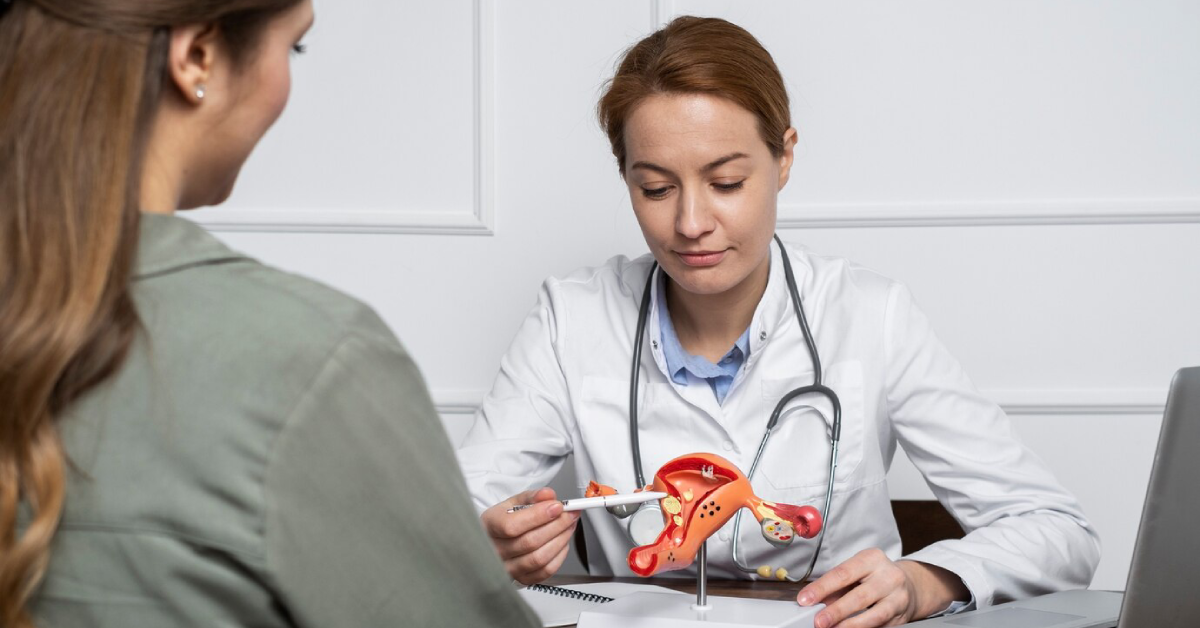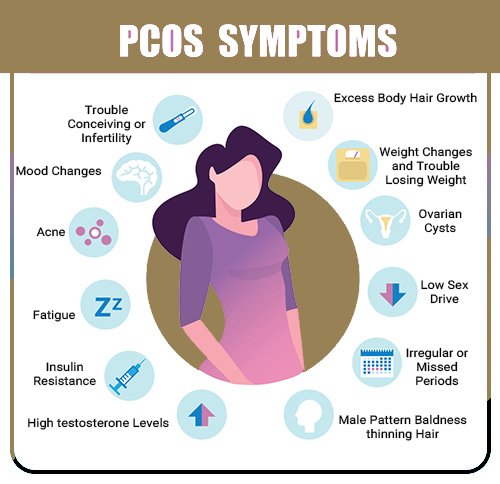Polycystic Ovary Syndrome, abbreviated as PCOS, is a not unusual endocrine disorder in ladies of reproductive age all over the global. It is marked through hormonal imbalance and occurs in a huge range of symptoms which can strongly have an impact on a female’s body and mental fitness. Although the call shows the occurrence of cysts at the ovaries, this is neither the most effective nor feature symptom of the syndrome. It is crucial to realise the complicated mechanisms, varied displays, and management options for PCOS to permit ladies to cope with this disheartening fitness situation.
The Hormonal Harmony GoneWrong: The Key to Understanding the Mechanisms Centrally, PCOS is a disturbance inside the exceptional hormonal concord that regulates the woman reproductive equipment.
Some of the key hormones concerned are:
- Androgens: Generally referred to as “male hormones,” together with testosterone, androgens are typically discovered in low stages in ladies. In PCOS, there’s an excessive amount of androgen manufacturing, and this may purpose many specific signs and symptoms which include hirsutism (an excessive amount of hair), acne, and male-pattern baldness.
- Insulin Resistance: A large percentage of ladies with PCOS have insulin resistance, a state in which the cells of the body grow to be less touchy to insulin. This can cause blood sugar levels to upward push and an elevated hazard for developing kind 2 diabetes. The pancreas then overproduces insulin to make up for this resistance, which, in flip, can motive the ovaries to release more androgens.
- Luteinizing Hormone (LH) and Follicle-Stimulating Hormone (FSH): These two hormones, released by the pituitary gland, are vital for controlling ovulation and the menstrual cycle. In PCOS, the balance of LH and FSH is often disrupted, which can interfere with the normal development and release of eggs from the ovaries. This hormonal disarray can lead to irregular periods or even absent periods, making conception difficult for some women.

Recognizing the Signs: What PCOS Really Looks Like
PCOS (Polycystic Ovary Syndrome) can look very different from one woman to another. Some women spot symptoms in their late teens, while others only realize something’s off when they’re trying to get pregnant.
Here are some common signs to watch out for:
🩸 Irregular or Missing Periods
One of the most common red flags. Your periods might come every few months, not at all, or be very unpredictable. This happens because ovulation isn’t regular—or doesn’t happen at all.
💁♀️ High Levels of Male Hormones (Androgens)
Your body might produce too much testosterone, leading to:
- Excess hair growth (called hirsutism) on the face, chest, back, or stomach
- Acne that sticks around and is tough to treat
- Hair thinning or balding, especially near the front or top of the scalp
⚖️ Weight Gain (Especially Around the Belly)
Many women with PCOS gain weight easily and struggle to lose it. This is often tied to insulin resistance, which means your body isn’t using insulin the way it should.
🥚 Polycystic Ovaries
An ultrasound may show ovaries with lots of tiny cysts or follicles. But here’s the thing: having cysts alone doesn’t mean you have PCOS.
💉 Insulin Resistance
When your body doesn’t respond well to insulin, it tries to make more. This can mess with your blood sugar and lead to dark patches of skin (called acanthosis nigricans) on areas like your neck or underarms.
👶 Trouble Getting Pregnant
PCOS is one of the top causes of infertility because it can stop ovulation from happening regularly.
💤 Constant Tiredness
Many women with PCOS feel tired all the time, sometimes because of linked conditions like sleep apnea.
😞 Mood Swings & Mental Health
Dealing with hormonal ups and downs—and the stress of managing symptoms—can increase the risk of anxiety, depression, and mood swings.
🏷️ Skin Tags
These are small, harmless bits of skin often found on the neck or underarms.
If any of this sounds familiar, it’s a good idea to see a doctor. PCOS is very manageable with the right support and plan.
Managing PCOS: What You Can Do
There’s no magic cure for PCOS, but there are plenty of ways to manage it and feel better day-to-day. The right treatment depends on your symptoms, lifestyle, and whether you’re trying to get pregnant.
🥗 Lifestyle Changes: The First Step
For many women, simple changes can make a big difference:
- Eat balanced meals: Focus on whole foods, lean proteins, healthy fats, and complex carbs. Try to cut down on sugar and processed foods.
- Move regularly: Daily exercise (even walking) helps improve how your body uses insulin, boosts your mood, and helps with weight.
- Lose a little weight if needed: Even losing just 5–10% of your weight can help with periods, fertility, and symptoms.
- Reduce stress: Try meditation, yoga, deep breathing—or just getting enough sleep.
💊 Medications Your Doctor May Suggest
- Birth control pills: Help regulate periods, lower testosterone, and manage acne and hair growth.
- Anti-androgens (like spironolactone): Help reduce unwanted hair and acne. Must be taken with birth control, since they can affect pregnancy.
- Metformin: Originally for diabetes, this helps your body respond better to insulin and may regulate periods.
- Fertility meds (like clomiphene or letrozole): Help stimulate ovulation if you’re trying to conceive. If these don’t work, stronger treatments like gonadotropins might be needed.
🎯 Targeted Treatments for Specific Symptoms
- Hair removal: You can use temporary options (like waxing or shaving), or go for long-term solutions like laser hair removal or prescription creams.
- Acne solutions: Topical creams, oral meds, or help from a dermatologist can keep skin clearer.
- Fertility help: If you’ve tried medications without success, treatments like IVF may be an option. Some women also consider a minor surgery called laparoscopic ovarian drilling (LOD) to help trigger ovulation.
Living with PCOS: You’re Not Alone
PCOS is a condition you’ll likely manage throughout life—but with the right plan, support, and care, you can feel in control of your body and your future.
Stay on top of:
- Regular checkups
- Managing risks like diabetes, heart disease, or sleep apnea
- Caring for your mental health
You don’t have to do it alone. Working with a doctor who listens—and finding what works for you, can make all the difference.




